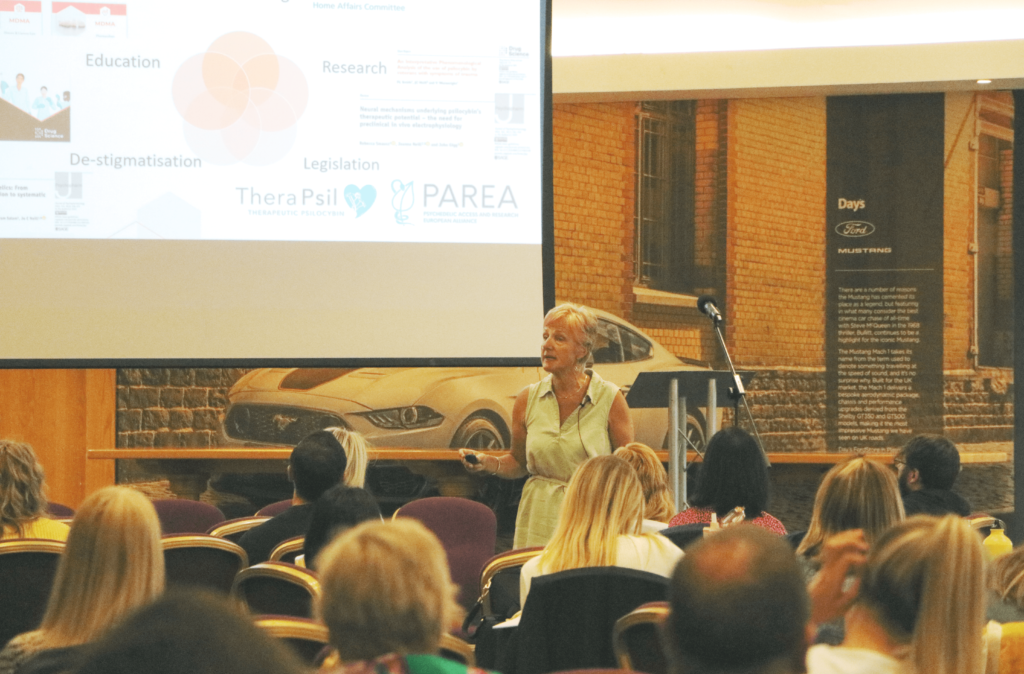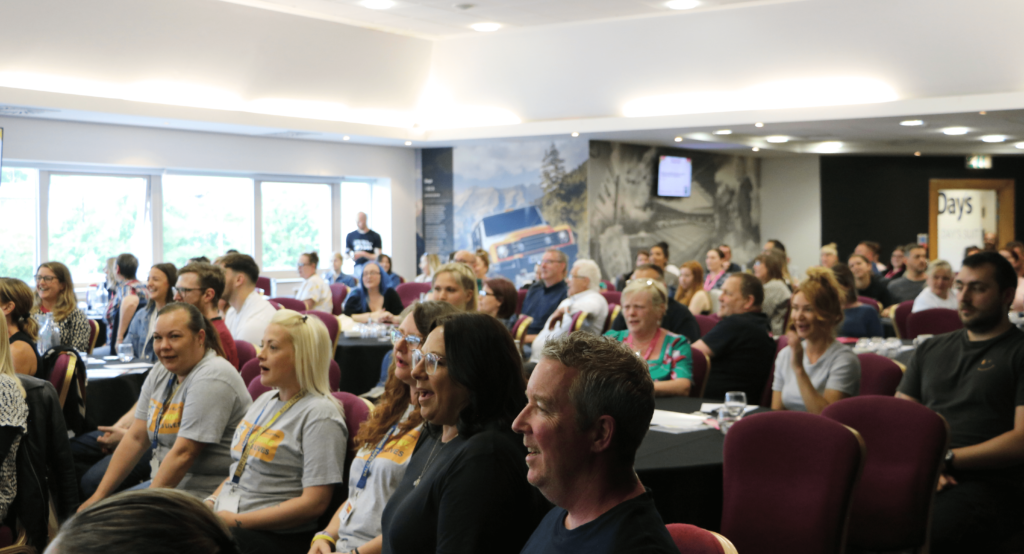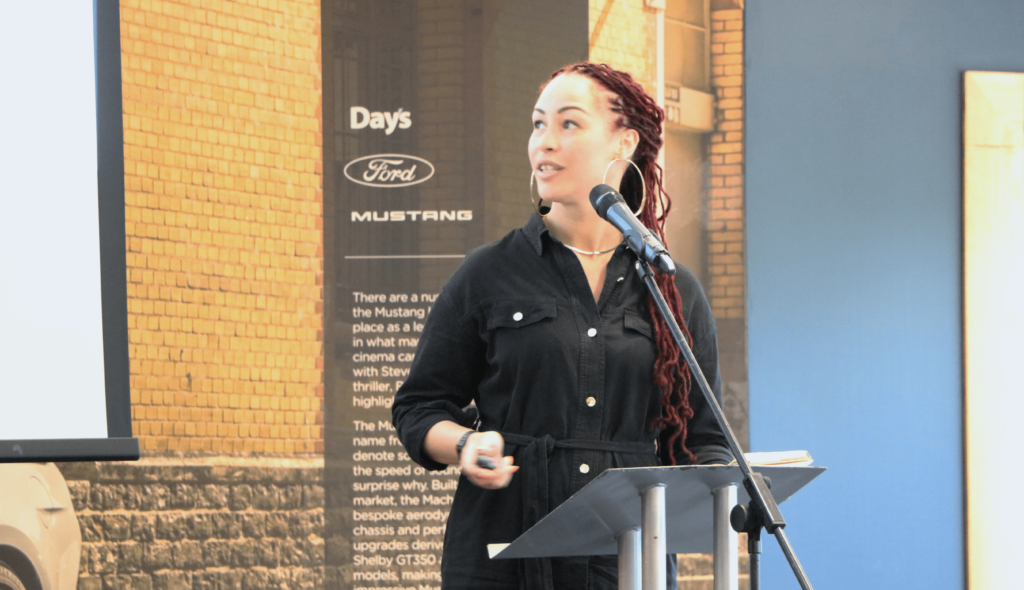If someone told me five years ago I’d be attending a work event which talked about psychedelic assisted therapy (PAT) and the decriminalisation of cannabis, I would have thought they were joking. But that’s the reality of things: as a society we are so engrained that drugs and the people who take them are inherently bad. Many of us don’t realise that psychoactive substances have a legitimate place in scientific research, notwithstanding the difficulties scientists face in accessing funding and permission to carry out said research. I was shocked when at university a module invited students to consider the social history of substance use, and shocked further when as a teaching assistant one of my present colleagues delivered a talk to a key stage 3 class which overtly accepted that people take drugs. It was then I realised that something was wrong about how we treat people who take drugs in society, and I set my sight on working for Barod. Drugs had always been fairly invisible to me as a young person, but I feel that is testament to the punitive drug laws which circulate stigma, oppression and exclusion in our country, and indeed across the world. The Barod Conference on 31st May in Swansea.com Stadium invited professionals across the substance use field to offer their thoughts on transforming the narrative created for substances and those who use them.
Jo Neill, Professor of Psychopharmacology at Manchester University, highlighted that we are in a mental health crisis. Mental health issues cost the UK £117.9 billion every year according to new research, and it is probably a fair assumption to say that mental health in our country is not drastically improving in response to this. I really began to scratch my head at our approaches to this crisis when Neill stated, ‘we don’t heal people in psychiatry, we manage people’s symptoms.’ The data Neill presented echoed that of data I’ve seen before while attending talks by Dr Chris Timmerman and others outside work. It shows evidence of how PAT can ‘heal people.’ What often surprises people is that PAT calls for trips; as Neill said, a high dose is required because ‘that is what causes the trip is what causes the healing process.’ Professionals calling for psychedelic trips to be available on the NHS? I never thought I’d see the day, but the evidence for its success is overwhelming. Magic mushrooms containing psilocybin have been assessed by leading Professor David Nutt as having one of the least potentials for causing harm to users and to others, closely followed by LSD and MDMA. Even cannabis is lower than legal substances alcohol and tobacco. However, we continue to prescribe medications which can cause more harm, have more overdose and dependence potential, and only manage symptoms as opposed to achieving any real healing. Why? Stigma.

Professor Jo Neill discussing the latest research and developments associated to psychedelic assisted therapy
Hannah Deacon, mother of Alfie who had his first seizure at 8 months old, told us the powerful story of her brave son who went through years of suffering which could have been avoided had research been allowed to be conducted on medicinal cannabis. Alfie’s condition, PCDH19 epilepsy, only effects nine boys globally and doctors did not know how to treat it. Alfie was given six anti-epileptics, steroids, morphine, and eventually his mother ‘started to question the drugs that he was on.’ Medicinal CBD (not the same as cannabis) stopped Alfie’s seizures without the side effects he had from the pharmaceutical drugs. How can the government justify allowing morphine to be given to a child that young when we know CBD can work with no risk of physical dependency? Deacon detailed the extensive anecdotal evidence she found online before exploring cannabis as an option for her son. Similar to this is the evidence of remission and response rates seen with LSD for substance use disorders, MDMA for intractable PTSD and substance use disorders, and psilocybin for treatment resistant depression and substance use disorders; all are drastically higher than anything being achieved by novel interventions and SSRIs. The call to action here seems clear: we need to realise the potential of stigmatised substances in medical spheres so that they can be researched, and we can harness their beneficial properties. This isn’t a call for a free for all legalisation, it’s for legitimate academic research.
Mattha Busby, a freelance journalist who attended the conference, shared a story about an ibogaine treatment he received in Mexico and how someone he met there who struggled with dependence was virtually transformed overnight. Busby highlighted how legalisation and decriminalisation outside the UK ‘hasn’t brought about an apocalypse’ which I think perfectly pictures the stigma around drug reform in the UK. Busby touched on drug consumption rooms and ‘drug checking’ in Copenhagen, raising how ‘there’s never been a fatal overdose in the facility as most if not all of the other such facilities across the world say.’ Busby attributed this to naloxone, and recalled meeting Peter Krykant in Glasgow who ran the Glasgow Overdose Prevention Service in an ambulance for some time. I remember seeing Krykant’s ambulance on display in Merthyr not long ago; the setting provides clean works, and most importantly perhaps an opportunity to provide harm reduction advice and increase the likelihood of individuals accessing support for their use.
Danny Ahmed, who led the Diamorphine Assisted Treatment (DAT) programme in Middlesbrough, described the successes DAT in client testimonials. For some reason, though, these approaches—drug consumption rooms and using diamorphine instead of replacing heroin with methadone—just do not seem to be an option to UK government despite evidence from Denmark, Portugal, Switzerland, and others that drug consumption rooms and access to drug checking does reduce drug-related deaths and does reduce drug use overall. Ahmed described how patients were trusted to self-administer, giving them autonomy and a role in their own safety. Ahmed revealed that a survey of patients revealed wellbeing had increased ‘to higher than the average population.’ Governments appear hesitant to replace one substance with another when we consider the success of psychedelics for substance use disorder, which seems almost hypocritical when the standard has always been to replace heroin with methadone. Neill shared with us that psychedelics have shown promise in having an impact on substance use disorders. Current data for PAS is suggesting that psychedelics are different to current interventions such as nicotine replacement therapy for smoking and instead work in a way that reduces cravings and reduces the likelihood of relapse. Within these models of treatment people who use drugs would not be stigmatised, excluded nor oppressed, but seen as valid members of society.

Delegates at #Barod23
It seems society is choosing to recognise the evidence and is taking matters into its own hands; Dom Maddox, second year student at the University of South Wales, explained how he is assisting in the creation of The Hi House on Treforest Campus. The Hi House aims to combat stigma and encourage people who are using drugs to access support to increase their safety. I see it in the students I speak to, in my clients who range between 18 and 25, they’re afraid to disclose details to me in case I call the police. We know the reality: young people will often do what you tell them not to do. Telling young people not to do drugs will not reduce drug-related deaths. Telling young people about the possible harms and how to stay as safe as possible could reduce drug-related deaths. Multiple news outlets are now reporting that Generation Z is having less sex than previous generations, suggesting perhaps a correlation between a modern educational harm reduction approach to sex amongst other factors and sexual activity being in decline. Abstinence models to sex education are being beaten by harm reduction. There is evidence to show that the same approach to drugs in other countries across the world has led to a decrease in criminality and a decrease in drug-related harm. Where is the sense? The Hi House acknowledges people’s choice to put something into their bodies, provides evidence-based harm reduction and chooses to address the problem by providing stress management and other support to tackle the reasons why students choose to use substances in the first place. The Hi House is far from a consumption room, but it’s an example of how those who choose to see the evidence are moving towards making a real change in terms of drug-related harms. As Busby stated, harm reduction and drug testing seem ‘an obvious way to reduce harm.’ Busby’s voice broke as he told us of his uncle who is now abstinent from heroin, but acknowledged the struggles he faced as a user and pondered on what could have been if approaches to problematic drug use were based on evidence rather than punishment.
In Wales we are practising harm reduction approaches to treatment, which is a step in the right direction, but what the Barod Conference revealed to me is that this is not enough. It’s imperative we treat the people who come to us for help with respect and we see them as people, but as workers we’re limited in what help we can give because of laws and it’s becoming evident to me that we could do so much more for our service users. Even more so, if we attempted to view substance use as a community issue, a country-wide issue that is our responsibility to prevent and treat, we could do more for individuals outside the Monday to Friday, nine to five. We can do our part as workers by going into schools, completing outreach, but really this is an issue for every single one of us in the UK: it’s our responsibility to ensure the conditions that turn people to problematic substance use, such as poor mental health, trauma, poverty, systemic racism, etc. are eradicated to the best of our ability. We need to see those afflicted as a community issue as it is usually flaws in our society which causes the optimum circumstances for problematic use to begin with. The government sees progressive drug reform as an ‘unnecessary electoral risk’ according to Busby, and this is strongly echoed by Deacon. Deacon’s message was clear: drug reform is ‘not about data…This is about money, and this is about politics…it should be about what we can do best for them.’ As Busby stated, the ‘law and order approach to drug policy clearly borders on the insane.’ Deacon was a mother who wanted to treat her son when she was told to ‘go home, make them comfortable.’ As Deacon said, ‘children are given unlicensed drugs on our NHS every single day of the week with no hesitation because they’re pharmaceutically produced products.’ It’s the stigma of cannabis that prevents it from being an option, not its efficacy nor benefits, not its potential risk.
It seems aside from the robust data provided by Jo Neill which should be enough, so much of what we know comes from stories. Mattha Busby gave us his lived experiences of drug laws and drug assisted therapies, Danny Ahmed gave us client testimony which explained why a programme was working so well for the people who accessed it, and Hannah Deacon told us the unnecessary struggle her family had to face daily for years. It seems stories, the voices of real people, are being silenced and ignored in favour of punitive drug laws. This could not be epitomised more than by Mackayla Forde, AKA RedMedusa. For me, Forde stood out. Not because of her poetry, or her jokes about reading from her phone, not even because of her animated energy, but because Forde told a room full of mostly white people how these laws have affected those in minority groups. Forde showed me that these stories which have been silenced are even more so for those of Black and Minority Ethnic background. Forde told us a story of epistemic violence, which she described as ‘a form of domination through erasure of knowledge.’ Forde’s definition is ‘a form of violence which is enacted through the delegitimising of forms of knowledge, usually originating from the global majority, in favour of hegemonic, usually Western, forms of knowledge.’ Forde told us that epistemic violence is ‘at the root of all punitive drug policy.’ This made me recall an essay I wrote in university, and how I had stumbled upon the following admission by John Ehrlichman, Assistant to the President for Domestic Affairs in Nixon’s presidency:
“You want to know what this [war on drugs] was really all about? The Nixon campaign in 1968, and the Nixon White House after that, had two enemies: the anti-war left and black people. You understand what I’m saying? We knew we couldn’t make it illegal to be either against the war or black, but by getting the public to associate the hippies with marijuana and blacks with heroin, and then criminalizing both heavily, we could disrupt those communities. We could arrest their leaders, raid their homes, break up their meetings, and vilify them night after night on the evening news. Did we know we were lying about the drugs? Of course we did.”

Mackayla Forde presenting her research around Epistemic Violence
How can we ignore this blatant admission? The laws upon which most modern drug policy is based is inherently entrenched in racism. It is about power; it is about oppressing people of colour and people who do not blindly conform. It is a blatant admission that minority groups were intentionally criminalised, and as Forde highlighted when it comes to drugs there are stereotypes, disproportionate rates of stop and search and disproportionate prison sentences for non-white people. As Caroline Phipps, our CEO, outlined in her opening address: we need to focus on services based on ‘equality, diversity and inclusion.’ It’s our responsibility, in an area that is predominantly white, to use our privilege for the better and raise the profile of these issues.
The evidence is screaming to be heard that these substances, like all other legal medicines and drugs, are not inherently bad but can be utilised in the right contexts, can be harnessed for good, and that punitive drug law fuelled by entrenched systemic racism, classism, colonialism and a need for control over the social order of things is a barrier to legitimate academic study which could lead to breakthroughs in medicine for physical and mental health. Current drug laws create a criminal demographic where one need not exist. They further entrench the conditions which often cause problematic substance use by alienating social groups who could otherwise access support. As Neil Woods, ex-police officer, highlights in his book Good Cop, Bad War, drug laws rarely impact the white middle class. Drug laws do not mitigate the harms caused by illegal drug trade. Drug laws rarely punish those who manufacture, they punish everyday users, those who traffic because they have no choice, where punishment is not the answer. The answer is, I think, better provisions for minority groups and indeed everyone who faces poverty in whatever form to increase their socio-economic conditions which would mitigate some of the reasons why they might fall into use. The answer is harm reduction. The answer is to research and learn more about these substances we are criminalising so that our choices and laws are informed, not entrenched in stigma, exclusion, and oppression.
Hannah Mealey is a transitional caseworker covering Cwm Taf and Bridgend. Hannah has worked for Barod since March 2022, working with families and young people. Hannah holds an undergraduate degree in history and studied the history of drugs and body politics, completing her dissertation on gendered presentations of heroin use in British public health campaigns in the 1980s. Hannah is currently aiming to undertake a Masters degree.

